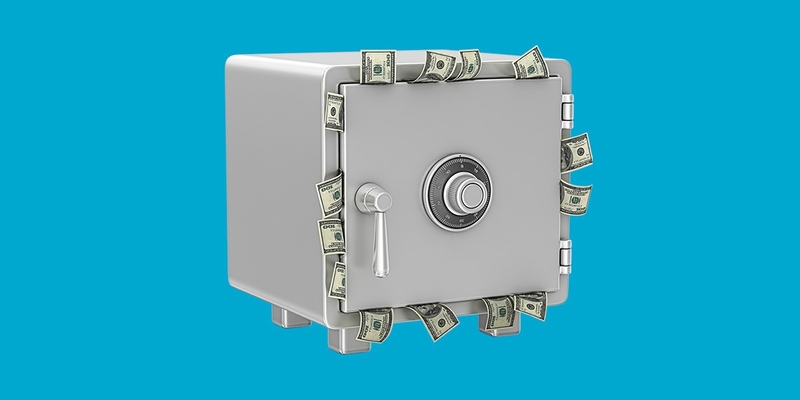Understanding Certificate of Deposit (CD)
May 18, 2024 By Susan Kelly
Certificates of Deposit (CDs) are products from banks and credit unions. They give you a way to invest your money where it is safe, and over time, grow with a fixed interest rate for an agreed period that can be a few months or many years long. When you buy a CD it means agreeing to put in a certain amount of money for a specific length of time. This is called the term. The cash gets locked away during this term and then you receive payments as interest on top from the institution where the certificate was bought at regular intervals like every month or year until its end date arrives, which signifies the maturity phase for your investment's duration. This article will discuss different aspects of CDs and explain why they are beneficial options to consider.
How Certificates of Deposit Work?
When you put money into a CD, you are agreeing to keep that amount deposited for a set period. This term is called the maturity period and it can be anything from just some months up to many years in length. As part of this commitment, the bank or credit union that issued your certificate will pay interest back to you at regular times or when it reaches its final date. Usually, the rate of interest available on CDs is more than what savings accounts offer which makes them appealing for people interested in growing their money with little risk involved. CDs carry fixed rates of interest, which signifies that the rate stays the same for an entire term. This characteristic provides investors with a sense of predictability and stability.

Alongside stable interest rates, certain banks give promotional rates on CDs. The purpose of this could be to bring in fresh customers or motivate existing ones into making larger deposits. These special rates might offer a better return, but they come with their conditions and could require you to make a higher minimum deposit. It's important to understand that the interest you earn from a CD is subject to federal as well as state taxes sometimes too; this can influence how much total return it provides depending on your tax situation. Comprehending these subtle differences can assist investors in making more knowledgeable choices about where to allocate their funds.
- Early Withdrawal Penalties: Most CDs impose penalties for withdrawing funds before the maturity date, which can reduce your overall returns.
- Interest Compounding: Some CDs compound interest daily, monthly, or quarterly, which can significantly increase your earnings over time.
Benefits of Certificates of Deposit
The safety and security that CDs provide is another benefit. Unlike other types of investments, they have a guaranteed return on investment. This makes them perfect for conservative investors or people who want to safeguard their principal amount. Also, CDs are insured by the FDIC (Federal Deposit Insurance Corporation) or NCUA (National Credit Union Administration) up to certain limits, which gives more protection. CDs offer flexibility in terms of maturity options. They are available for different lengths of time, from short-term to long-term, so investors can select what matches their financial objectives best.
Apart from safety and certain returns, CDs can act as a savings instrument requiring discipline. Because the money is locked for a set time, it discourages unnecessary spending and supports investors in achieving their financial targets. Additionally, CDs may be "laddered" - an investment tactic in which one buys several CDs with varied maturities - to allow more frequent use of funds while still receiving higher interest rates on longer-term deposits. This strategy balances liquidity needs with the benefit of higher returns from longer-term CDs.
- No Market Risk: Unlike stocks or bonds, CDs are not subject to market volatility, ensuring steady returns.
- Automatic Renewal: Many banks offer automatic renewal of CDs, which can be convenient but requires monitoring to ensure you still get the best rates.
Features of Certificates of Deposit
CDs provide different options that can make them an alluring investment. You have the choice to select between fixed-rate and variable-rate CDs. Fixed-rate CDs present a set interest rate for the whole term, while variable-rate CDs might change their interest rates at certain intervals depending on the market situation. Also, some CDs allow you to take out your interest payments at specific times without any penalty. This gives investors a regular income flow. Furthermore, there could be a minimum deposit for certain CDs and larger deposits often mean higher interest rates.
Other features that stand out are callable CDs, which give the bank the right to end the CD if interest rates go down within a specific time frame. Normally, these CDs start with better rates because of this termination risk. Additionally, no-penalty CDs allow taking out money early without penalties but usually offer lesser interest rates compared to usual CDs. Knowing about these characteristics can assist investors in choosing the type of CD that suits their financial requirements and risk capacity.
- Callable CDs: These can be redeemed by the issuing bank before maturity, usually in a declining interest rate environment.
- No-Penalty CDs: These allow early withdrawals without penalties but often come with lower interest rates.
Considerations Before Investing in CDs

It is very important to think about a few things before you invest in CDs and make sure that they match your financial goals. First, look at how much money you can access easily and decide if it works for your financial situation to keep the funds in a CD for some time. Also, check interest rates from various banks or credit unions to find out who offers better deals on return on investment. Also, it is very important to study the CD's terms and conditions. This includes potential penalties if you wish to withdraw your money early. Make sure there are no unpleasant surprises in store for you later on. Finally, think about spreading your investments across different types of assets that provide different levels of risk and return for a more diversified investment portfolio.
Another important thought is the situation of interest rates at present. When interest rates grow, short-term CDs might look more appealing as they enable you to put your money back in faster at higher rates. On the other hand, when interest rates decrease, it could be better to fix a long-term CD to safeguard bigger profits before the rates fall further down. Furthermore, comprehending how inflation affects your CD returns is crucial. The effects of inflation can wear down the value of interest income you earn from your CD as time goes by.
- Interest Rate Environment: Choose CD terms based on whether rates are rising or falling to maximize returns.
- Inflation Impact: Consider how inflation might affect the real return on your CD investment over time.
Conclusion
To sum up, when you put your money in a Certificate of Deposit (CD), it's like giving it to the bank for a set period at an agreed interest rate. The bank holds this money and gives it back to you with the added interest when the CD matures. These financial tools are beneficial for those who want low-risk savings growth because they give sure returns, allow flexibility in choosing when to receive your money, and provide stability during these times of changing financial situations. By knowing about CDs' characteristics and advantages while also considering what you hope for with your finances, you can make wise choices that maximize how well your investment collection works along with achieving long-term monetary targets.





